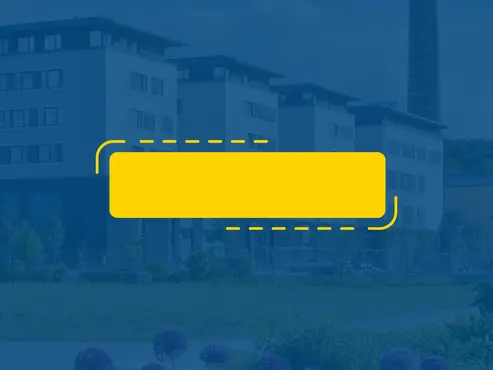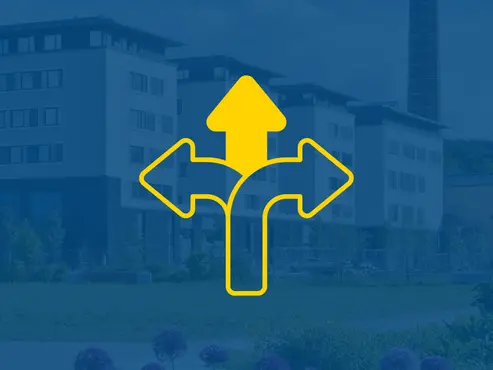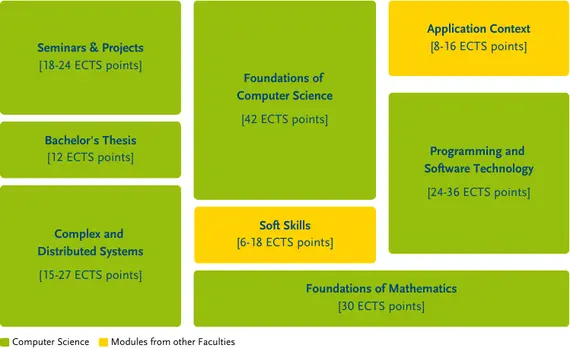Structure and Curriculum
New regulations starting in winter semester 2024/25
The start of the computer science course has been completely revamped! Additional professors have significantly expanded the range of courses on offer and established new areas of specialization. The following will apply from the winter semester for all those who decide to switch to the new regulation. Detailed information on how to switch and which consequences to bear in mind will be published by the examination board.

New name: The degree program is now called “B. Sc. Computer Science”.
The previous focus on “Software Systems Science” remains in the form of selectable study specializations (e.g. “Software” or “Systems”), but now there is even more!

More choices!
The compulsory program was aligned with the basic skills standardized by the German Informatics Society. This creates more room
for individual interests, new study focuses, the recognition of modules from other universities - e.g. after stays abroad or when changing degree courses - and for looking beyond the horizon and into other faculties.

New specialization available: Theoretical Computer Science
The foundation for computer systems! Do you love mathematics and want to understand and be able to prove how and why computers are able to solve the world's problems? Then this specialization is just right for you. Because nothing is more practical - and more necessary! - than a good theory.
Structure of the degree program to date
The bachelor’s programme in Software Systems Science is based on a standard programme duration of six semesters and leads to the conferral of the Bachelor of Science (B.Sc.) degree. It provides wide-ranging elective options and therefore allows students to align areas of specialization with their own interests in various fields of software systems science, particularly in programming, software engineering and in complex and distributed systems.
The degree programme is comprised of the eight module groups outlined below.
A1: Foundations of Mathematics
In this module group’s compulsory courses, students are taught the fundamentals of mathematics relevant to understanding computer science methods and studies in Software Systems Science. This pertains particularly to analysis, linear algebra, propositional and first-order logic, and statistics.
[30 ECTS-Points]
A2: Foundations of Computer Science
This module group comprises an introduction to computer science as well as further basic courses on computer science. The curricula of these courses prepare the students for advanced-level lectures and cover algorithms and data structures, concepts of theoretical informatics, formal programme analysis, information security, and data management.
[42 ECTS-Points]
A3: Programming and Software Technology
In addition to the compulsory introduction to software engineering (with its team project dealing with software development), students become acquainted with concepts of advanced imperative, object oriented, and functional programming. Furthermore, courses about artificial intelligence, web development, user interfaces, and the development of embedded systems can be selected. These modules aid in developing an area of focus within the degree programme.
[24-36 ECTS-Points]
A4: Complex and Distributed Systems
This module group provides students with an overview of methods and concepts used in developing mobile, complex, and distributed systems. This encompasses modules pertaining to data communication and the programming of such systems. Furthermore, students can better define a specific area of focus by choosing modules in logic, ubiquitous systems, and internet communication.
[15-27 ECTS-Points]
A5: Application Context
This module group affords students extensive opportunities to expand their knowledge base by enrolling in courses of applied computer science, business informatics, the humanities, human sciences and education, social sciences, economics and business administration. Bearing in mind each module’s specific requirements, these may be chosen freely from each faculty’s respective catalogue of courses offered as bachelor’s degree subsidiary subjects but should bear some relevance to Software Systems Science.
[6-18 ECTS-Points]
A6: Soft Skills
Within the scope of soft skills, students are familiarized with research methods as well as ethics for the digital society. Additionally, students may choose to take courses in project management or improve their foreign language skills, essential to future careers in fields with ever increasing international activity and cooperation.
[6-18 ECTS-Points]
A7: Seminars and Projects
In addition to the compulsory lab, students must take a total of two seminars and at least one project in the subject areas of computer science and applied computer science. At least one seminar and the project must be in the subject area of computer science. These courses are meant to provide a more in-depth examination of specific topics in the areas of computer science, applied computer science and information systems relating to Software Systems Science. These courses therefore also prepare students for working on systematically organized team projects and foster key skills such as the presentation of project results or the target-oriented execution of goal-oriented, practical projects.
[18-24 ECTS-Points]
A8: Bachelor’s Thesis
Within the scope of the bachelor’s thesis, students employ academic methods to work independently on a specified topic from the field of computer science as it relates to Software Systems Science. More detailed information concerning the choice of a subject area for the bachelor’s thesis can be found in appendix 2 of the subject examination regulations.
[12 ECTS-Points]
